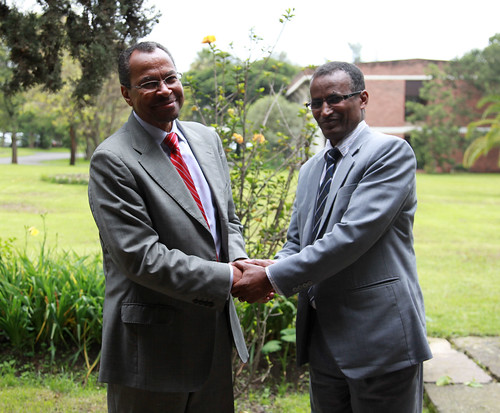
Jimmy Smith, Director General of the International Livestock Research Institute (ILRI) with Gebregziabher Gebreyohannes, State Minister for Livestock Development in the Ministry of Agriculture (photo credit: ILRI/Apollo Habtamu).
Today, Gebregziabher Gebreyohannes, newly appointed State Minister for Livestock Development in Ethiopia’s Ministry of Agriculture, visited the International Livestock Research Institute (ILRI) in Addis Ababa.
He was welcomed by ILRI Director General Jimmy Smith, who offered his congratulations on the minister’s appointment. ‘We know you as a scientist; now we know you as a science politician’. Smith explained that ILRI’s research is intended to help people transform their lives through livestock. Ethiopia, with its large livestock sector and population, is a very important focus for ILRI’s work, Smith said: ‘If we can’t make a difference here – where livestock is so important – we can’t do it anywhere!’
Smith emphasized that ILRI aims to add value to the work of the Ethiopian government and institutions. ‘We would like to make a positive contribution to Ethiopian livestock development, and, through this work, to derive and share lessons and learning in other places.’
Shirley Tarawali introduced ILRI’s new strategy – its objectives, focus and current status. She referred to a recent June 2013 discussion of this strategy, in which Ethiopia stakeholders and partners provided feedback on the strategy.
Iain Wright elaborated on the operationalization of this strategy in Ethiopia. His presentation briefly introduced various ongoing projects: Livestock and Irrigation Value Chains, Livestock and Fish small ruminant value chains, Africa RISING, Nile Basin Development Challenge, Index-Based Livestock Insurance (IBLI), Safe Food Fair Food and development of a livestock master plan for Ethiopia. He drew attention to the growing role of the ILRI Addis Ababa campus as a CGIAR hub, ILRI’s growth in Ethiopia (more staff, more investments), and initial ideas to develop the campus as a global centre for research on sustainable intensification in the face of climate change.
The State Minister welcomed the renewed ILRI investments in Ethiopia and expressed strong interest in the various ideas and the potential for cooperation. He highlighted existing joint projects, such as LIVES, and the former Improving Productivity and Market Success of Ethiopian Farmers (IPMS), that are a good basis for future scaling up of useful technologies. He said that he will also be ‘very strong’ in asking ILRI and CGIAR for support to implement the ministry’s plans for the livestock sector.
We are pleased to be with you . . . and pleased that you are with us! — Gebregziabher Gebreyohannes, Ethiopian State Minister for Livestock Development
Subsequent discussion between the State Minister, his staff and ILRI staff covered various topics of mutual interest including animal health, livestock genetic improvement, pastoral development, livestock feed supply, livestock sector transformation, delivery of services to farmers and capacity development. It was suggested that this initial higher level brainstorming could be followed up on a more regular basis to deepen the collaboration.
